De Duitse dichter en schrijver Rainer Kirsch werd geboren op 17 juli 1934 in Döbeln. Zie ook alle tags voor Rainer Kirsch op dit blog.
Aufschub
Damit wir später reden können, schweigen wir.
Wir lehren unsere Kinder schweigen, damit
Sie später reden können.
Unsere Kinder lehren ihre Kinder schweigen.
Wir schweigen und lernen alles
Dann sterben wir.
Auch unsere Kinder sterben. Dann
Sterben deren Kinder, nachdem
Sie unsere Urenkel alles gelehrt haben
Auch das Schweigen, damit die
Eines Tages reden können.
Jetzt, sagen wir, sit nicht die Zeit zu reden.
Das lehren wir unsere Kinder
Sie ihre Kinder
Die ihre.
Einmal, denken wir, muß doch die Zeit
kommen.
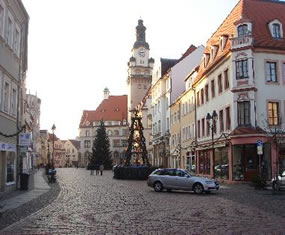
Döbeln, centrum
De Amerikaanse dichter, schrijver en vredesactivist Mattie Joseph Thaddeus Stepanek werd geboren in Washington D.C. op 17 juli 1990. Zie ook alle tags voor Mattie Stepanek op dit blog.
A New Hope
I need a hope.a new hope.
A hope that reaches for the stars, and
That does not end in violence or war.
A hope that make peace on our earth, and
That does not create evil in the world.
A hope that finds cures for all diseases, and
That does not make people hurt,
In their bodies, in their hearts
Or most of all, in their spirits.
I need a hope.a new hope,
A hope that inspires me to live, and
To make all these things happen,
So that the whole world can have
A new hope, too.

Hier met comedian Jerry Lewis (rechts)
De Zwitserse schrijver Jakob Christoph Heer werd geboren op 17 juli 1859 in Winterthur-Töss. Zie ook alle tags voor Jakob Christoph Heer op dit blog.
Uit: An heiligen Wassern
»Ja, es thut’s!« erwiderte er den Gruß kurz, doch mit freundlichem Wort. Er bläst die Rauchwolken einer Zigarre in die Luft und tätschelt den Hals des Tieres: »Kleiner, es geht bergan, wehre dich, am Schmelzwerk wartet die Galta auf dich, wehre dich.« Als habe das struppige zähe Pferd Verständnis für seine Zurede, reißt es mit jeder Liebkosung stärker an den Strängen, aber von Zeit zu Zeit nötigt es der steile ausgewaschene Weg, mit dem Wägelchen stille zu stehen und Atem zu schöpfen. Dann fliegt ein Zug der Ungeduld über[Pg 7] das Gesicht des Mannes, doch er faßt sich, legt einen Stein unter das Rad und wartet ruhig, bis das Tier von selber den mühsamen Zug wieder aufnimmt. Langsam geht die Fahrt, doch wer ins Glotterthal fuhrwerkt, ist sich dessen gewöhnt. »Am Schmelzwerk wartet die Galta auf dich,« wiederholt der Führer. Aber von Hospel bis zum Schmelzwerk sind es drei Stunden zu Fuß, mit dem Fuhrwerk noch mehr, und dann ist es noch eine Stunde nach dem Dorfe St. Peter, das weltverloren unter den Firnfeldern der Krone liegt. Der Weg windet sich, wenn er die Rebberge von Hospel verlassen hat, in eine Felsenschlucht, über der alte Föhren ihre blaugrünen Schirme halten, dann berührt er in dem sich weitenden Thal die Dörfer Fegunden und Tremis, die mit sonngedunkelten Holzhäusern auf grüner Wiesenhalde liegen, und wird eben. Tief unter ihm gischtet der Fluß in der Felsenschlucht, die altersgrauen Lärchen neigen sich darüber und schwanken im Luftzug, Bergnelken hangen über die Ränder und verzieren den Abgrund mit blühendem Rot. Nur das Rauschen der Glotter und das gleichförmige Ticktack der Merkhämmer einer großen Wasserleitung, die in entlegener Höhe dahinführt, unterbrechen die Stille des Thales.“
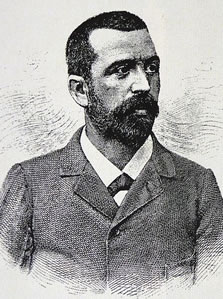
Jakob Christoph Heer (17 juli 1859 – 20. August 1925)
De Poolse futuristische schrijver Bruno Jasieński (eig. Wiktor Zysman) werd geboren op 17 juli 1901 in Klimontov.Zie ook alle tags voor Bruno Jasieński op dit blog.
Uit: I Burn Paris (Vertaald door Soren A. Gauger & Marcin Piekoszewski)
„Thrown into a common cell, the prisoners demanded to be relocated to a section for political prisoners. The prison authorities refused. The prisoners responded with a hunger strike.
Each day, huddled in his corner like a defensive hedgehog, greedily wolfing down his soup with bread, Pierre felt fifteen pairs of grim, steely eyes dilated by the atropine of hunger upon him, and under their gaze the tasty mouthful of prison bread, whose yeast was swollen with saliva, formed an unpalatable ball which stuck in his throat, and the thick soup went cold, developing a layer of skin in the mess tin.
From afar, as if from behind a glass wall, nighttime conversations would reach his ears. Words, carved like blocks, rose and climbed one on top of the other, and after a while a lofty edifice had grown towards heaven. All they had to do was go outside, roll up their sleeves and they could raise the edifice with real stone, perfectly, just as large and sturdy.
The world, like a badly constructed machine, destroyed more than it created. It could not go on like this. It all had to be stripped down to the nuts and bolts, discard anything unnecessary, dismantle and reassemble anew, once and for all. The plans are ready, the fitters are itching to go, it’s just the old, rusty iron won’t allow it. It took root and now the tissue is interwoven with rusty stitches – every thread needs to be torn out with our teeth.“
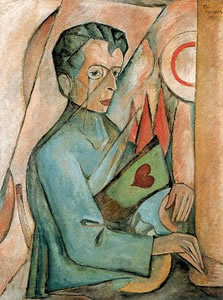
Portret doorTytus Czyżewski
De Hebreeuwse schrijver Shmuel Yosef Agnon (eig. Shmuel Yosef Czaczkes) werd geboren in Buczacs, Galicië (nu in Oekraïne) op 17 juli 1888. Zie ook alle tags voor Shmuel Yosef Agnon op dit blog.
Uit: A Whole Loaf(Vertaald door I.M. Lask)
“The waiter returned. Or maybe it was another waiter and, because I was so hungry, I only thought it was the same one. I jumped from my chair in order to remind him of my presence. He came and stood and bowed to me as though mine were a new face. I began wondering who this waiter could be, a fresh fellow or the one from whom I had ordered my food; for if he were a fresh waiter, I would have to order afresh, and if it were the same one, all I had to do was to remind him. While I was thinking it over, he went his way. A little later he returned, bringing every kind of food and drink, all for the fellows sitting to the right or the left of me.
Meanwhile fresh guests came and sat down and ordered all kinds of food and drink. The waiters ran and brought their orders to them. I began to wonder why they were being served first when I had been there before them. Maybe because I had asked for a whole loaf and you could not get a whole loaf at present, so they waiting till they could get one from the baker. I began to berate myself for asking for a whole loaf, when I would have been satisfied with even a small slice.”
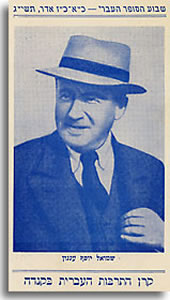
Shmuel Yosef Agnon (17 juli 1888 – 17 februari 1970)
De Australische schrijfster Christina Stead werd geboren in Rockdale, New South Wales op 17 juli 1902. Zie ook alle tags voor Christina Stead op dit blog.
Uit:The Man Who Loved Children
“Visitors looked awkward there, arrayed in the accidents of life’s put-together and rough-and-tumble, laughing uncouthly, unexpectedly at imbecile jokes, giving tongue to crackpot idioms; yet they thought themselves important, and it appeared that as they ran about the streets things happened to them. They had knots of relations with whom they argued and sweethearts to whom they cooed; they had false teeth, eyeglasses, and operations.
(…)
Before the children were only lemonade glasses, but before the adults were wineglasses. The children suspected that even on this occasion the sherbet of paradise was to be drunk under their dry lips by the loudmouthed, money-pocketed monsters who had them in thrall. Why didn’t these giants ravish the table, send the food flying besides, gobble, guff, grab, and gourmandize? To be bestial giants with the power of sherbet and also to exhibit such mean-spirited stinginess towards their own appetites was a conundrum the children could never solve. Let them once be such giants, let them even have the privilege of Louie, and they would not leave a crumb on a plate nor a drop in a bottle. The children sighed internally and ate as hard as they could hoping by their hunger to soften the miserliness of their elders.”
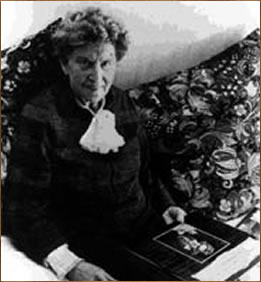
Christina Stead (17 juli 1902 – 31 maart 1983)
Zie voor onderstaande schrijvers ook mijn blog van 17 juli 2010.
De Japanse schrijver Michio Takeyama werd geboren op 17 juli 1903 in Osaka.
